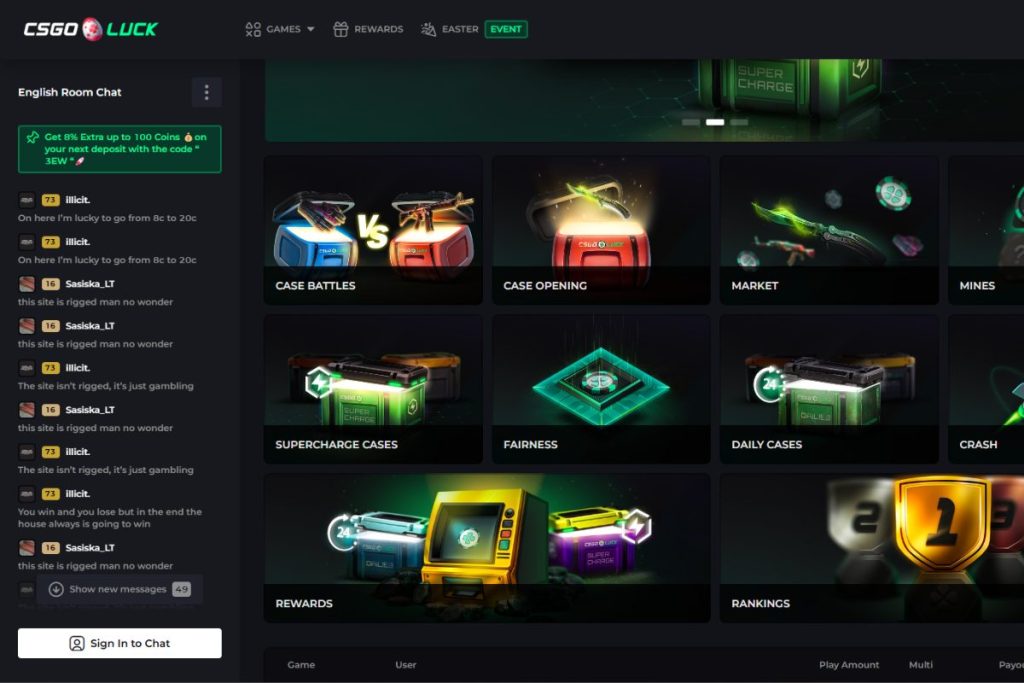Capturing Moments
Your go-to blog for photography tips and inspiration.
From Pixels to Profit: The Rise of Skin Betting Platforms in the Gaming Industry
Discover how skin betting platforms are transforming the gaming industry, turning pixels into profit and reshaping the future of online gaming!
Understanding Skin Betting: What It Is and How It Works
Skin betting refers to the practice of wagering virtual items, often in the form of in-game skins, on the outcome of video game matches or events. This phenomenon has gained traction within the gaming community, particularly in titles like Counter-Strike: Global Offensive and League of Legends, where players collect and trade skins as a form of digital currency. While skin betting provides an engaging way for players to invest in their hobby, it also raises important questions about legality and ethics, especially concerning younger audiences who might be more susceptible to gambling-like environments.
To understand how skin betting works, it's essential to grasp the mechanics behind it. Players typically deposit their skins into an online betting platform, which then allows them to vote or place bets on various outcomes, such as match winners or tournament outcomes. The value of these skins can vary greatly, sometimes worth hundreds or even thousands of dollars. When a player wins a bet, they receive a payout, usually in the form of more valuable skins or real money. However, just like traditional gambling, skin betting carries risks, and it's crucial for participants to approach it with caution and awareness of the potential consequences on both finances and gameplay.

Counter-Strike is a highly popular first-person shooter game that has captivated gamers since its release. Players are divided into teams, either terrorists or counter-terrorists, and compete in various objective-based game modes. For those looking to enhance their gaming experience, you can check out the daddyskins promo code for great in-game items and skins.
The Legal Landscape of Skin Betting in the Gaming Industry
The advent of skin betting has introduced a significant shift in the gaming industry, raising numerous legal questions and challenges. Initially popularized through platforms associated with games like Counter-Strike: Global Offensive (CS:GO), skin betting allows players to wager virtual items, or 'skins,' on the outcomes of competitive gaming events. However, the classification of these skins—whether they are considered virtual goods, currency, or gambling assets—has led to a patchwork of regulations across different jurisdictions. In some regions, skin betting has come under strict scrutiny, with bodies like the UK Gambling Commission stepping in to establish clearer guidelines, and enforcing age restrictions to ensure compliance with gambling laws.
As the legal landscape for skin betting continues to evolve, it is essential for gamers, operators, and investors to stay informed about ongoing regulatory changes. Many countries are now exploring potential legislation that could better define the legal status of skins, as well as the responsibilities of online platforms that facilitate skin betting. For instance, countries like the United States have seen varied approaches at both the federal and state levels, complicating the operational landscape for gaming companies. Understanding these nuances not only helps mitigate the risk of legal repercussions but also aids in fostering a safer gaming environment for users.
Are Skin Betting Platforms a Game Changer for Gamers and Investors?
The rise of skin betting platforms has sparked a significant transformation in both the gaming and investment landscapes. These platforms allow players to bet with in-game cosmetic items, known as skins, rather than traditional currency. The appeal lies in their ability to merge entertainment with the potential for profit, thereby attracting both avid gamers looking for new experiences and investors seeking to capitalize on this growing niche. By introducing a new layer of excitement, skin betting enhances the overall gaming experience, making it a potential game changer for the industry.
From an investment perspective, skin betting platforms present unique opportunities. As the market for virtual goods continues to expand, savvy investors can take advantage of the fluctuations in skin values, driven by supply and demand dynamics. Additionally, these platforms often integrate innovative technologies such as blockchain, ensuring transparency and security in transactions. This blend of gaming and finance not only appeals to a younger, tech-savvy demographic but also signifies a shift in how we perceive value in the digital realm, paving the way for a new era of investment in the gaming sector.